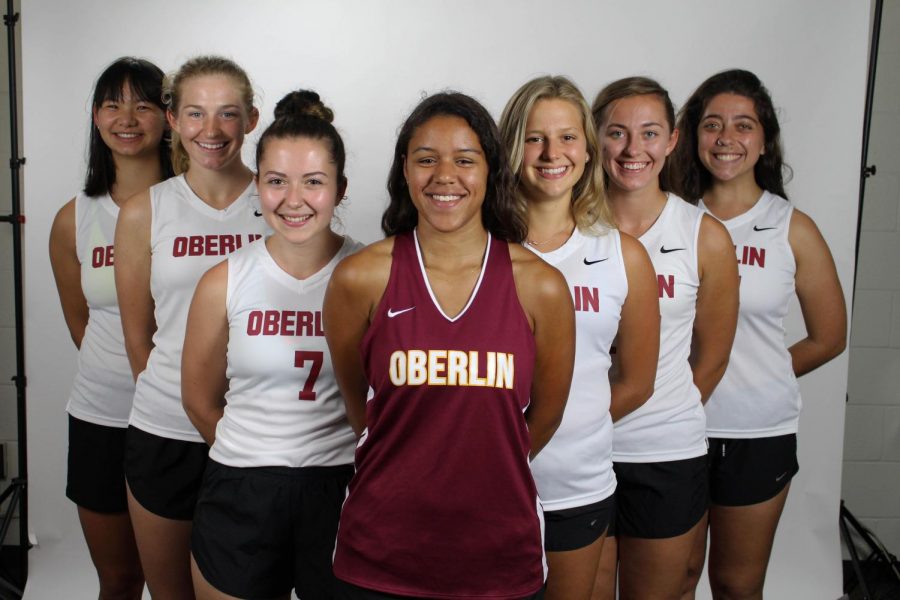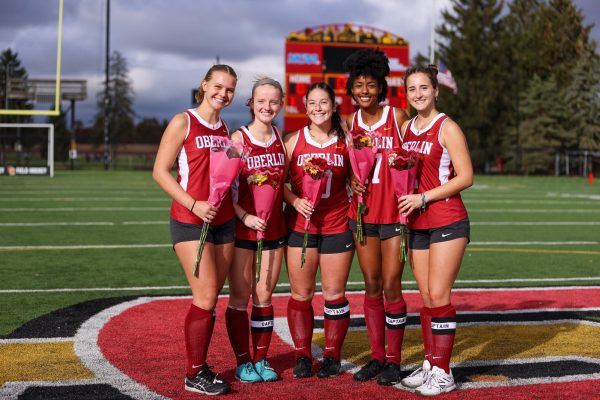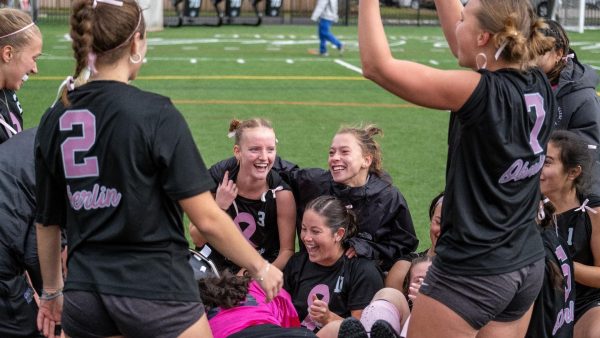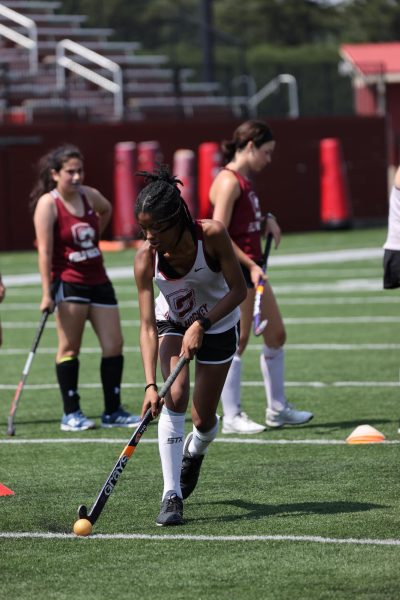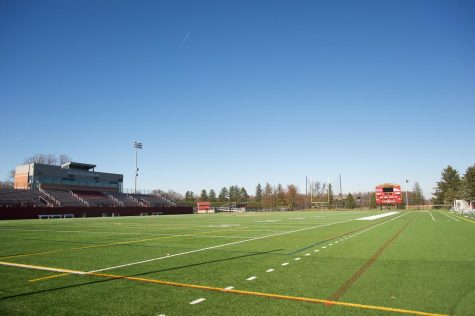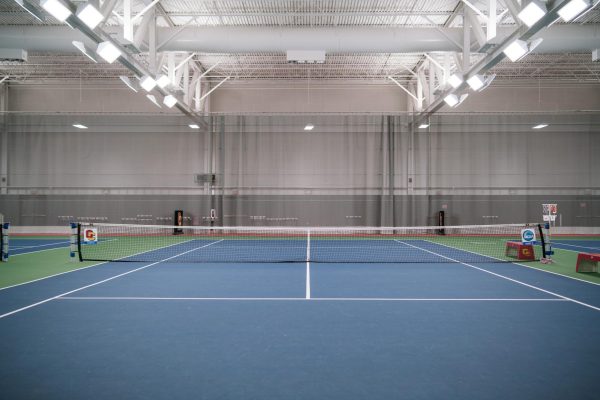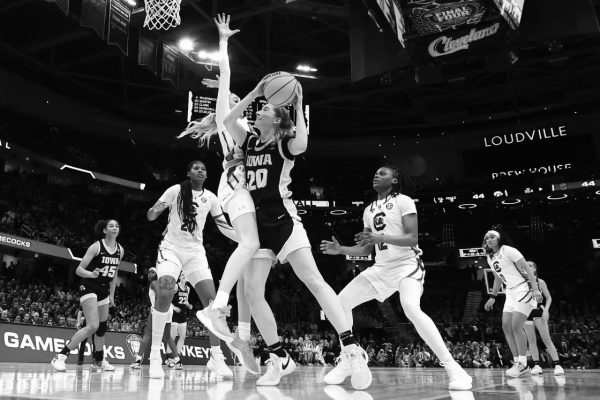Field Hockey Maximizes Holistic College Experience
Photo Courtesy of OC Athletics
The seven seniors on the field hockey team.
Field Hockey Head Coach Tiffany Saunders had no idea she wouldn’t be returning to Radford University at the conclusion of her fifth season as the lead assistant coach of the Highlanders. The news came in February 2014 that the school would be cutting its field hockey program, leaving Saunders shocked and uncertain about where she would end up next. Saunders had spent four years as a starter for the Highlanders before beginning her coaching career, and Radford, VA, was home.
When Saunders was hired as the new field hockey coach at Oberlin College a year later, she promised to never take a day for granted or forget where she came from. She said her college coach — who always made his team feel like family — molded her into the coach she is today.
“My coach at Radford was there for 25 years prior to them discontinuing our program,” Saunders said. “You never know when things might change. We had a really strong family feel through our alumni base since he had been there for so long. He made us all feel like family. [We would have] spaghetti dinners at his house with his kids sitting next to us. His wife did all the cooking.”
The Oberlin field hockey team regularly makes an effort to spend time together off the field through community service and crafting nights — hobbies that Saunders said many of her players share. The team paints pumpkins together every year, and recently began a tradition of tie-dying T-shirts.
“My best friends were made while I was in school,” Saunders said. “I know that college can be stressful sometimes, especially here at Oberlin with the academic intensity. I think part of my role [as a coach] is to understand that you’re a person as well. We have goals to hit as a team, but you’re here to have fun and enjoy your team and overall college experience.”
Senior captain Emma Broun said her teammates have become her second family since she spends so much time with them.
“The general culture [of the field hockey program] is very focused on kindness, care, and love,” Broun said. “Nobody told our team that we have to love each other and spend time together off the field — we just do. Of course, we all have the common goal of playing good field hockey and winning games, but basing an entire two months of our lives on beating other teams won’t necessarily create the kind of environment we all want to live in. Instead, the common goal we are encouraged to pursue by our coaches [and each other] is being kind to others.”
Broun and her teammates show kindness to each other by supporting one another’s interests and commitments outside of field hockey.
In addition to playing field hockey, Broun competes for the club bowling team, works for the Wilder Hall Student Union, and takes guitar lessons at the Woodshed Lesson Studio. Still, Broun isn’t the only player on the team with a jam-packed schedule.
According to Saunders, the list of things her players have been involved in is endless: Residential Education, the Big Parade, various community involvement initiatives, co-ops, the Review, and Student Senate. Saunders believes that if she respects her players’ commitments outside of field hockey, they will give her their all when it is time to put on their jerseys and pick up their sticks.
“I think [as coaches] we’re here to help shape the experience,” Saunders said. “It’s an amazing thing when you can do everything you want to do. If you can do it — and it comes down to time management and motivation — who am I to hold you back? Just keep me in the loop. I want to see all the fun.”
Broun said that the support she and her teammates receive from their coaching staff helps them succeed in the classroom and in their extracurriculars — not just on the field.
“[Coach Saunders], of course, wants us to keep field hockey as a top priority, but knows that each person on the team is much more than just a field hockey player,” Broun said. “With everything we do, Coach encourages balance and moderation.”
Because she believes in encouraging her players to maximize their college experience, Saunders allowed all seven of her rising seniors to study abroad last spring — rare even for a Division III program. Three players studied in Cuba, and the remaining seniors spent a semester in New Zealand, Denmark, the Netherlands, and Morocco. According to Saunders, four more field hockey players are considering going abroad this spring.
Two-time captain and senior Kennedy Kline said there was never much concern over the lack of senior leadership last spring because of how much trust there was among the rest of the team, and how well everyone communicated with each other. Juniors Libby Royer — the team’s third captain — and Luisa McGarvey were selected by the rest of the team as temporary springtime captains. Kline said she thinks that prompting the underclassmen to step up last spring will benefit the team this fall.
“[Libby and Luisa’s] leadership skills, as well as those of our other juniors and sophomores, developed immensely during the past semester and have already helped shape our team this season,” Kline said. “On paper we have three captains, but so many people on our team have stepped up and proven themselves as leaders.”
According to both Saunders and Kline, communication will be the most important factor in the team’s success.
“The way we interact with each other and care about each other is the most important component of our team,” Kline said. “The bond that we have helps us communicate on the field and off, push each other, and support each other.”
The field hockey team went 1–19 last year, but Saunders expects the team to win more games this year. She had her players return to campus a little earlier this August than in previous years, and began running three-a-days: morning fitness, afternoon skills, and night play. According to her, the team’s strengths are experience and depth.
No matter how many games they win — they’re currently 1–2 — Saunders is certain that each player to go through the program will emerge a better leader, competitor, and person.
“I value winning, but I understand the big picture — who you become while you’re here,” Saunders said. “You have to enjoy your time on the team and that will show on the field. We have a fantastic culture, and everyone outside of our team can sense that. The next phases will come as long as we continue to value the chemistry and bond that has been built. That is how you grow a program.”


